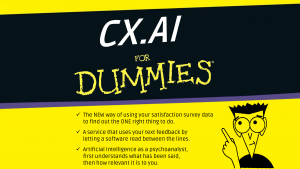CX.AI for Dummies:
The NEW Way to Use Your Satisfaction Survey Data To Do the Right Things
Companies want happier customers. Satisfied customers will buy more, pay higher prices, recommend more to friends, and stay longer with the company.
That’s why every company is asking its customers for their satisfaction. In such a survey, most customers also tell in their own words why they are satisfied or unsatisfied.
Large companies get so much feedback. It’s impossible to read it all. But not reading is not an option. It would be a customer assault and a waste of pure gold.
Stop Wasting Customer Feedback
That’s why companies use intelligent software to read this text feedback. As an outcome, the software puts a tag to every customer feedback. These tags describe the themes that had been mentioned, such as “great service” or “too expensive”.
Now companies are counting those themes to see which are most often mentioned. They assume that those most frequently mentioned topics are most important. This seems to be true because the topics are the answer to the question, “please describe WHY you are satisfied or dissatisfied.”
Reading Between The Lines
Unfortunately, a fair amount of essential topics are not raised as frequently. Instead, clients mention topics often that come first to their minds. For example, Home Speaker clients are referring to “great sound” first. Insurance clients are saying “great service” first, and restaurant guests are noticing “great taste”. Interestingly, improving those topics will not necessarily make customers much happier.
Imagine you go to the doctor with pain in your stomach to find out why. He may ask you why you have this pain. But should he take your ideas for granted?
Or, you go to a psychologist because you fear spiders. He may ask you, “why do you fear spiders”. But should he take your answer for granted?
Human Become an Expert with Training – so does Artificial Intelligence
A doctor needs long years of studying and practicing to understand underlying reasons based on what patients tell them.
In the same way, intelligent software can study what hundreds or thousands of customers had been saying. It can find out which topics are a clear indicator of satisfied or dissatisfied customers.
For instance, many speaker customers give “great sound” as a reason. A fair amount of them, however, have not a very high satisfaction score. In contrast, not so many customers give “reliable music streaming” as a reason, but all of them are very satisfied.
Which topic do you believe is more powerful to make customers happy?
CX.AI takes your customer feedback to find the hidden truth
It delivers insights on what makes customers happy, companies successful, and insights leader powerful again.
CX.AI uses an intelligent software that tags customer feedback. It does this with a precision as if a human would do it. But at the speed of light.
CX.AI further uses an intelligent software to study all customer feedback. Just like a psychiatric doctor studies patients for years and years. But at the speed of hours.
Reliability equals Profit
The best thing with CX.AI is that it is so reliable.
Imagine, a doctor would use not very reliable knowledge and therefore would give the wrong medication to every second patient. Would you go to this doctor?
CX.AI has four times higher reliability than conventional approaches. Let me ask you: What reason could justify NOT using reliable insights? What reason justifies taking the wrong medication?
Why would you want to make your customers NOT happier by a factor 4 higher reliability?
Why would ever someone want customers that buy NOT more? … that not pay higher prices? … that not recommend more to friends, or not stay longer with the company?
You know the answer.
